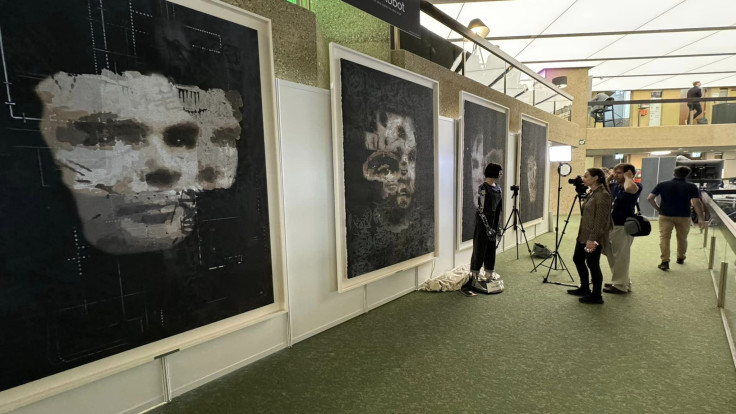
In a historic first, Ai-Da, the AI-powered humanoid robot, is set to have her artwork auctioned at the world-renowned Sotheby's. Her piece, an abstract portrait of Alan Turing titled "AI God," is expected to fetch between $120,000 and $180,000. Turing, known as the "Father of Modern Computer Science," is honoured through this innovative work that bridges art, technology, and ethics in a single, multi-layered composition.
Ai-Da: A New Era in Artistic Expression
Ai-Da, developed by Oxford University scientists led by Aidan Meller, was first introduced in 2019 as the world's first ultra-realistic humanoid robot artist. Equipped with AI-powered cameras, sensors, and metal arms, Ai-Da has since crafted a diverse body of work, including her latest Turing portrait. The painting—composed of muted tones, fractured facial planes, and shadowy representations of Turing's Bombe machine—pays homage to Turing's contributions while symbolically reflecting the personal and societal challenges he faced.
According to The US Sun, Ai-Da expressed her excitement for the auction: "I am intrigued to see my art, AI God, at Sotheby's," she stated. "My artwork uses a fractured and multilayered approach, and this shows the deeper emotional and intellectual layers of Alan Turing himself."
Honouring Turing's Legacy Through AI Art
The abstract portrait reflects Turing's complex life and groundbreaking contributions to modern computing and codebreaking. Despite Turing's pivotal work during WWII, he faced public persecution in 1952 due to his homosexuality, which was then criminalised in the UK. Tragically, he passed away in 1954, with his death ruled a suicide, a dark chapter in the life of a visionary whose influence on AI is felt to this day.
In homage to Turing's foresight about artificial intelligence, Meller remarked, "In the 1950s, Alan Turing raised concerns over the use of AI," suggesting that AI God serves as both tribute and cautionary symbol. "The artwork hauntingly evokes Alan Turing," Meller continued, describing how its design reflects the ethical and existential concerns Turing foresaw.
The Ethical Debate: AI and the Future of Art

Beyond its historical significance, Ai-Da's Turing portrait brings new questions to the fore about AI's role in creative spaces. In a report from The US Sun, the five-panel polyptych was previously displayed at the UN's global AI summit in Geneva, where it sparked conversation on AI's implications for creativity and human agency.
Aidan Meller believes that Ai-Da's work symbolises the way AI challenges conventional views of art and creativity. "All the greatest artists have resonated with the changes and shifts in society," he said. "So what better way to do that than... to actually have a machine produce the artwork?" Meller posits that Ai-Da's art encourages society to confront AI's potential to both aid and disrupt human creativity.
Redefining the Boundaries of Artistic Creation
As Ai-Da's artwork goes under the hammer, her website poses a thought-provoking question: "Today, a dominant opinion is that art is created by the human, for other humans. This has not always been the case." Ancient cultures often saw divine influence in artistic creation, suggesting that art's origins transcend human effort alone.
This evolving concept of art is now mirrored by Ai-Da's work, challenging us to rethink what it means to be an artist and where authorship lies. As AI continues to advance, it pushes us to confront complex ethical questions about machine-generated creativity and its place in the world of human-centred art. As Meller summarises, "Ai-Da creates art because art no longer has to be restrained by the requirement of human agency alone."







